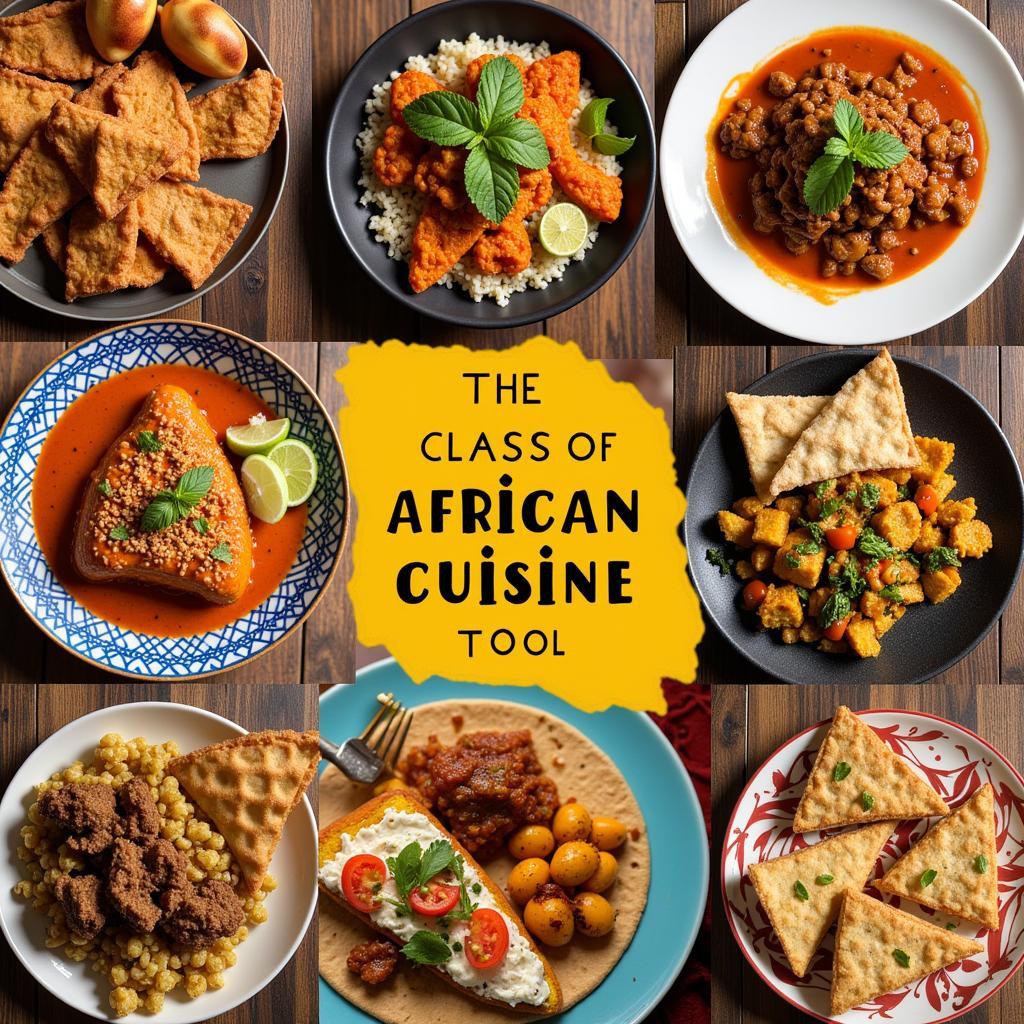The African Diet Plan: A Guide to Healthy Eating
The African Diet Plan is more than just a set of rules; it’s a celebration of diverse culinary traditions with a focus on fresh, whole foods. This approach to eating emphasizes nutrient-rich ingredients and time-honored practices passed down through generations.
Exploring the Rich Tapestry of African Cuisine
The African continent is a melting pot of cultures, each with its unique culinary traditions. From the fragrant tagines of Morocco to the spicy jollof rice of West Africa, the diversity of flavors and ingredients is truly remarkable.
 African Cuisine Diversity
African Cuisine Diversity
A common thread uniting these diverse cuisines is a strong emphasis on fresh, whole foods. Staples like grains, legumes, fruits, and vegetables form the foundation of the African diet, providing essential nutrients and promoting good health.
“Growing up, our meals were always centered around what we harvested from our garden,” shares Abena Asare, a nutritionist specializing in traditional African diets. “It was a way of life that fostered a deep appreciation for fresh, seasonal ingredients.”
Key Components of an African Diet Plan
An authentic African diet plan is characterized by its emphasis on natural, unprocessed foods. Here’s a closer look at the key components:
- Grains: Staple grains vary across regions, with millet, sorghum, and maize being particularly popular. These grains are rich in fiber, B vitamins, and minerals.
- Legumes: Beans, lentils, and peas are integral to many African dishes, offering a good source of protein, fiber, and iron.
- Fruits and Vegetables: From plantains and mangoes to leafy greens and root vegetables, the African diet is abundant in fresh produce, providing essential vitamins, minerals, and antioxidants.
- Healthy Fats: Palm oil, coconut oil, and shea butter are traditionally used fats, providing flavor and contributing to overall health.
- Lean Protein: Fish, poultry, and beans are common protein sources, while red meat is consumed less frequently.
Embracing the Flavors of Africa
Spices and herbs play a vital role in African cuisine, not only enhancing flavor but also offering potential health benefits. Turmeric, ginger, garlic, and chili peppers are just a few examples of the vibrant spices that add depth and complexity to African dishes.
Health Benefits of an African Diet Plan
The traditional African diet, with its emphasis on fresh, whole foods and minimal processing, offers a range of potential health benefits:
- Improved Heart Health: The abundance of fruits, vegetables, and whole grains can contribute to lower cholesterol levels and reduced risk of heart disease.
- Weight Management: The high fiber content in the African diet can promote satiety, potentially aiding in weight management.
- Reduced Risk of Chronic Diseases: The antioxidant-rich foods in the diet may help protect against certain types of cancer and other chronic diseases.
 Healthy Ingredients in African Diet
Healthy Ingredients in African Diet
Adapting the African Diet Plan for Modern Life
While the principles of the traditional African diet remain relevant, adapting it to modern lifestyles is key. Here are some practical tips:
- Embrace Local Produce: Explore local farmers’ markets to source fresh, seasonal fruits and vegetables.
- Experiment with Traditional Recipes: Try incorporating traditional African recipes into your meal planning.
- Choose Whole Grains: Opt for whole-grain varieties of bread, rice, and pasta.
- Limit Processed Foods: Minimize your intake of processed foods, sugary drinks, and unhealthy fats.
- Cook More Meals at Home: Cooking at home allows you to control the ingredients and portion sizes.
Conclusion
The African diet plan, rooted in tradition and rich in flavor, offers a holistic approach to healthy eating. By embracing the principles of fresh, whole foods and mindful eating, you can embark on a culinary journey that nourishes both body and soul. If you’re looking to incorporate more diverse, healthy options into your diet, the African diet plan is an excellent place to start.
FAQs
Q: Is the African diet plan suitable for vegetarians?
A: Yes, the African diet can be easily adapted for vegetarians. Legumes, grains, vegetables, and fruits provide ample sources of protein and other essential nutrients.
Q: Where can I find authentic African recipes?
A: Online resources, cookbooks, and cultural centers are great places to find authentic African recipes. You can also explore african american diet meal plan for inspiration.
Q: Is palm oil healthy?
A: Palm oil can be part of a healthy diet in moderation. Choose sustainably sourced red palm oil, which is rich in nutrients.
Q: Can I follow an African diet plan if I have dietary restrictions?
A: It’s best to consult a healthcare professional or registered dietitian to tailor the African diet plan to your specific dietary needs.
Q: What are some easy ways to start incorporating African foods into my diet?
A: Start by adding a side of leafy greens like collard greens or kale to your meals, try incorporating more beans and lentils into your dishes, or experiment with spices like turmeric and ginger. You can also find interesting recipes featuring ingredients like african horned cucumber for a unique twist.
Discover more fascinating insights about African culture and lifestyle. Check out these articles:
Need assistance? Contact us at +255768904061, email [email protected], or visit us at Mbarali DC Mawindi, Kangaga, Tanzania. Our dedicated customer support team is available 24/7.


